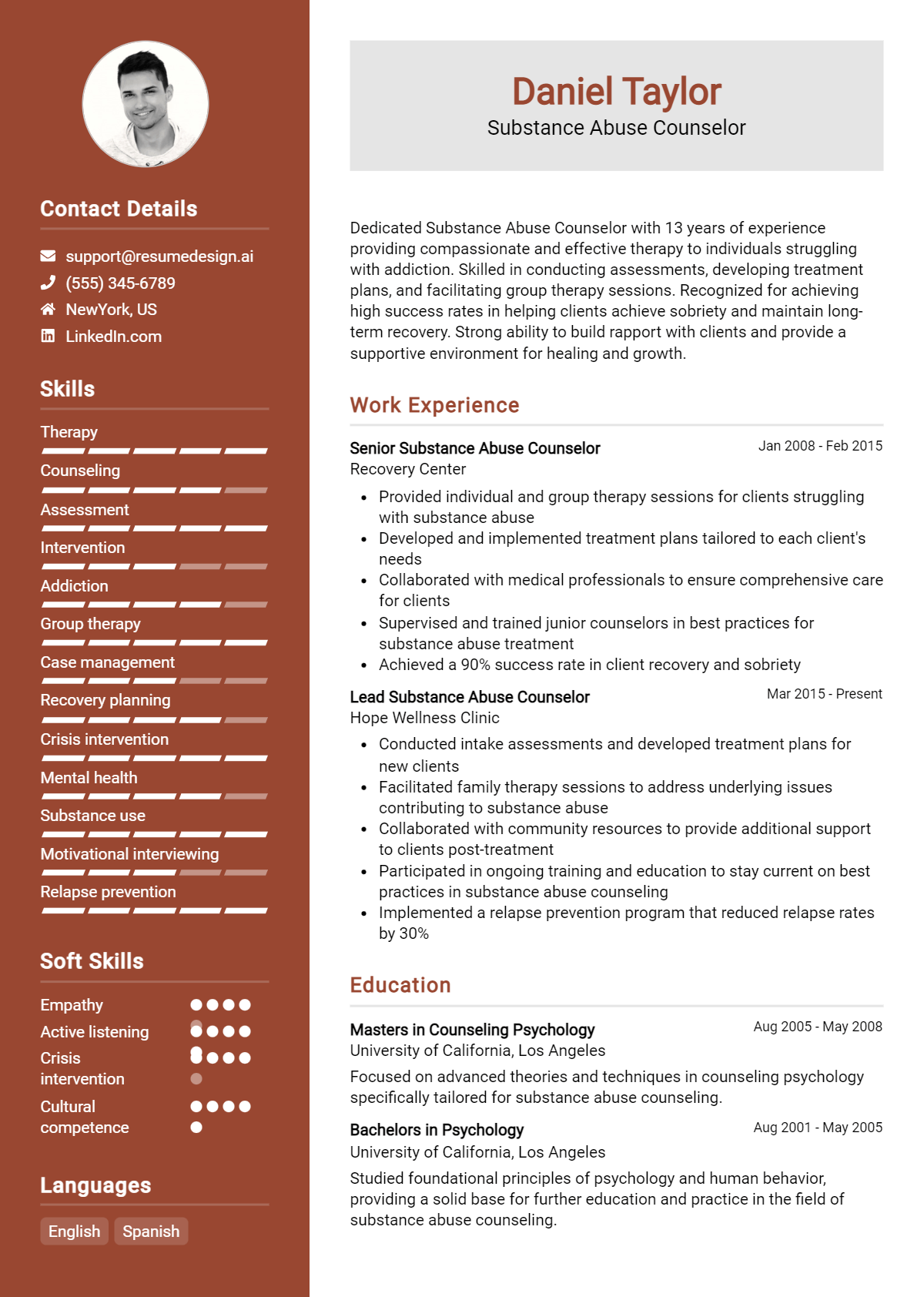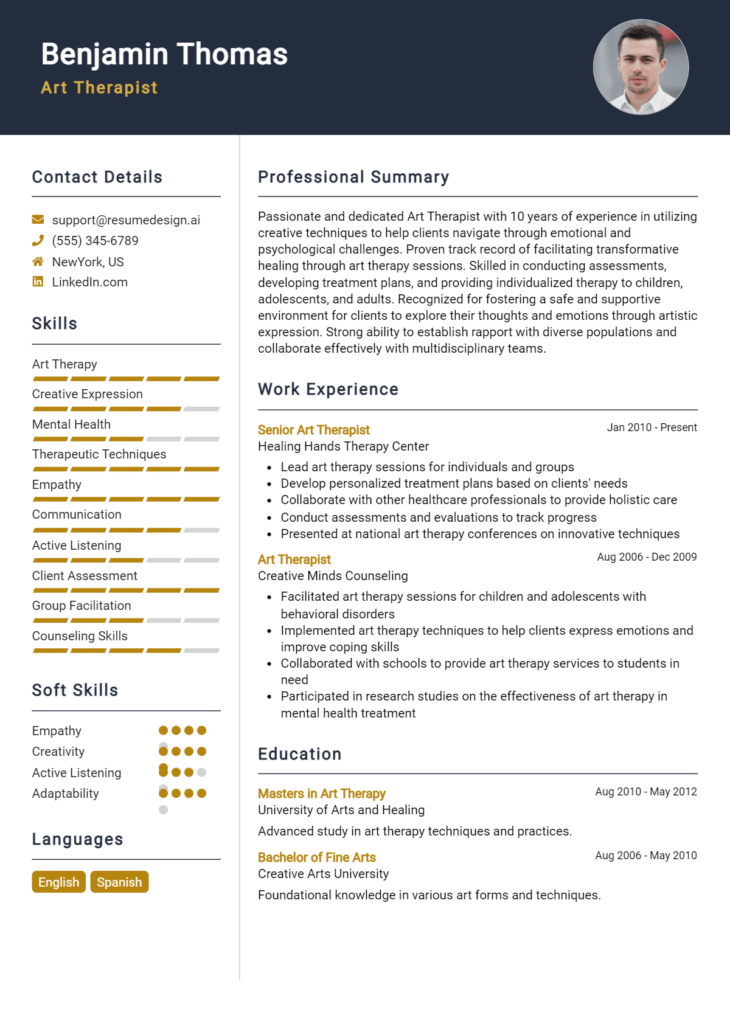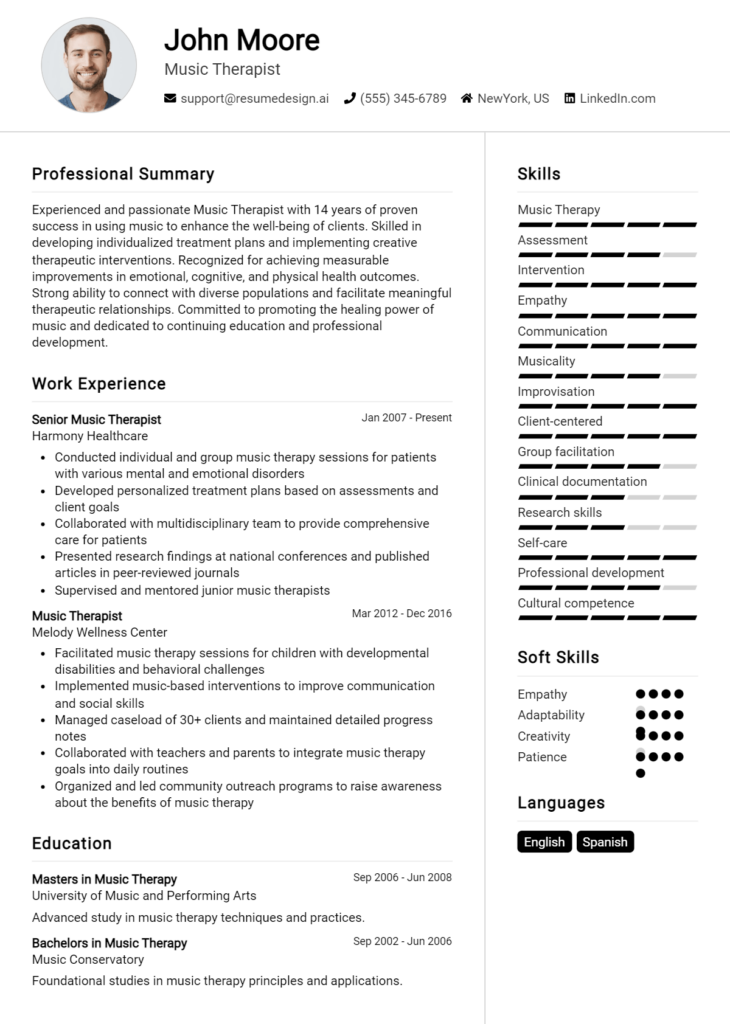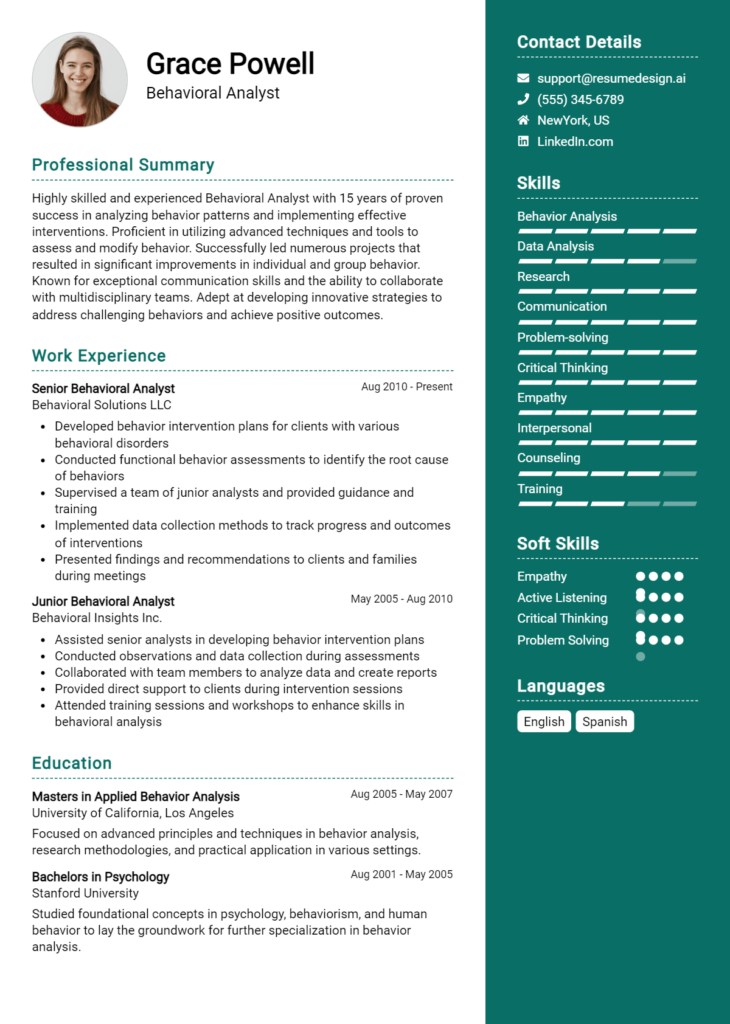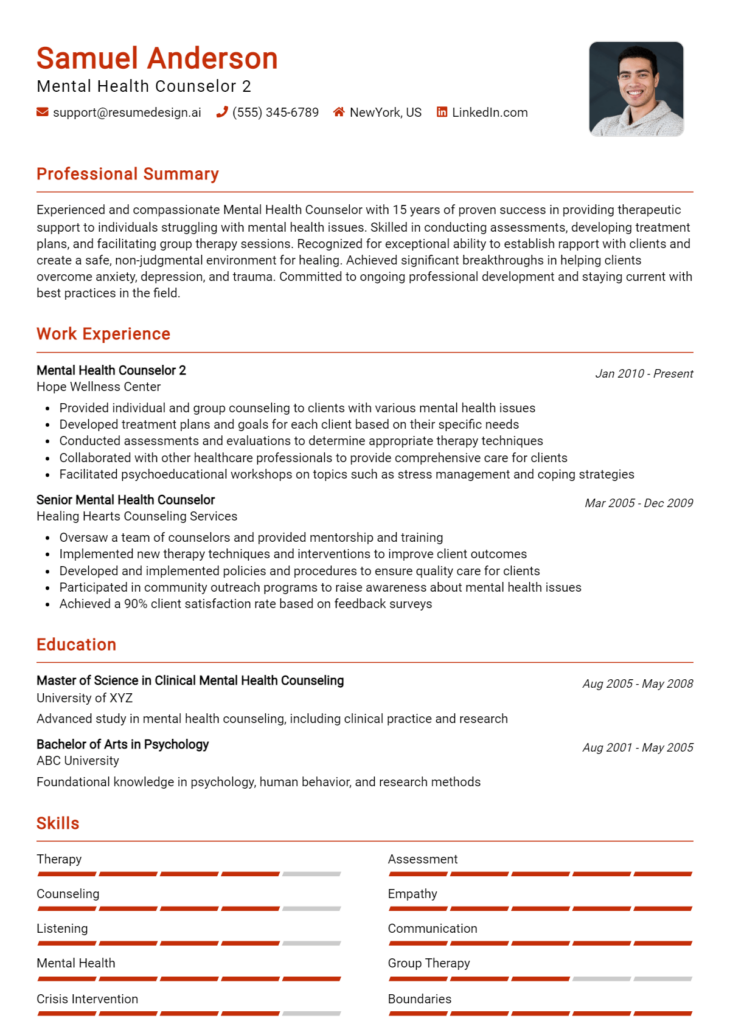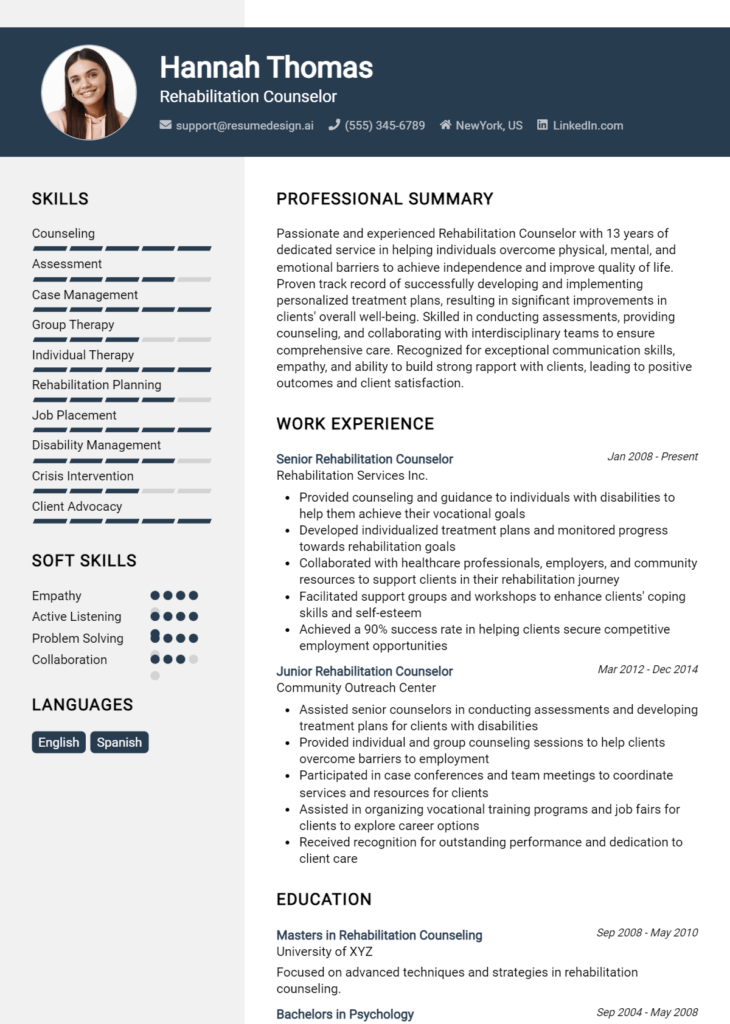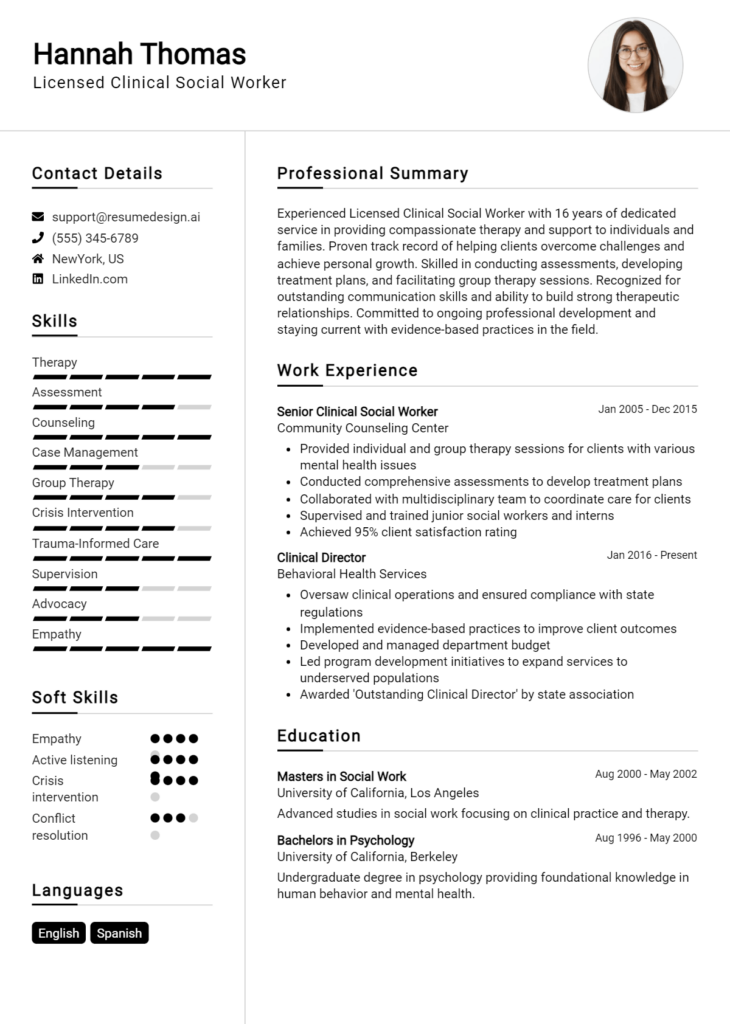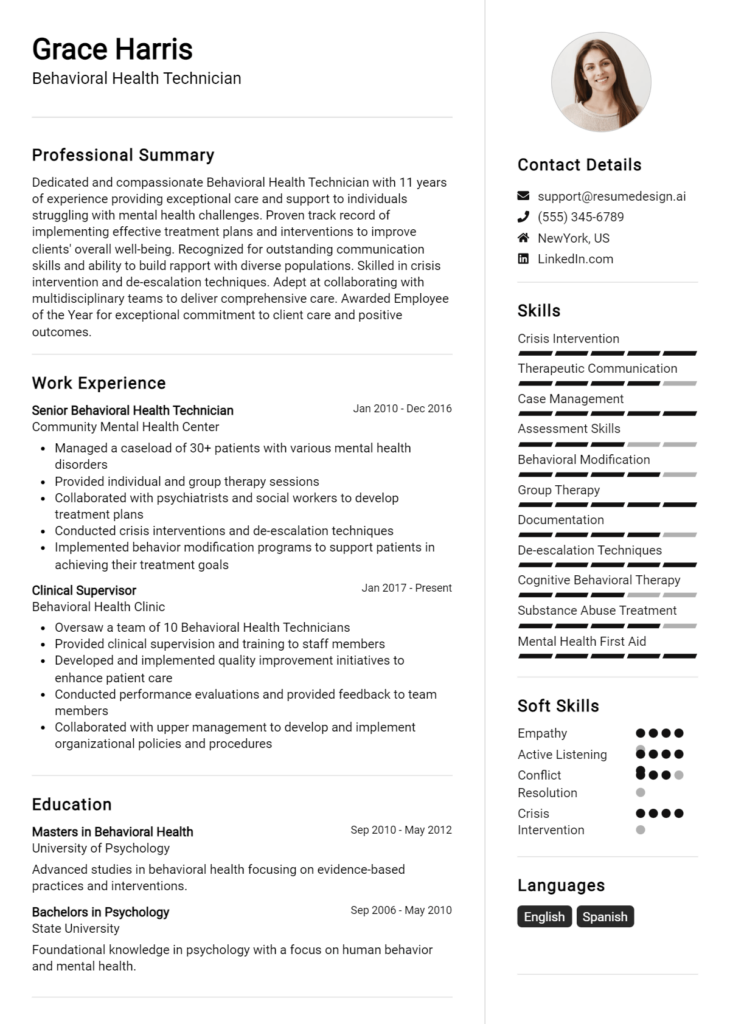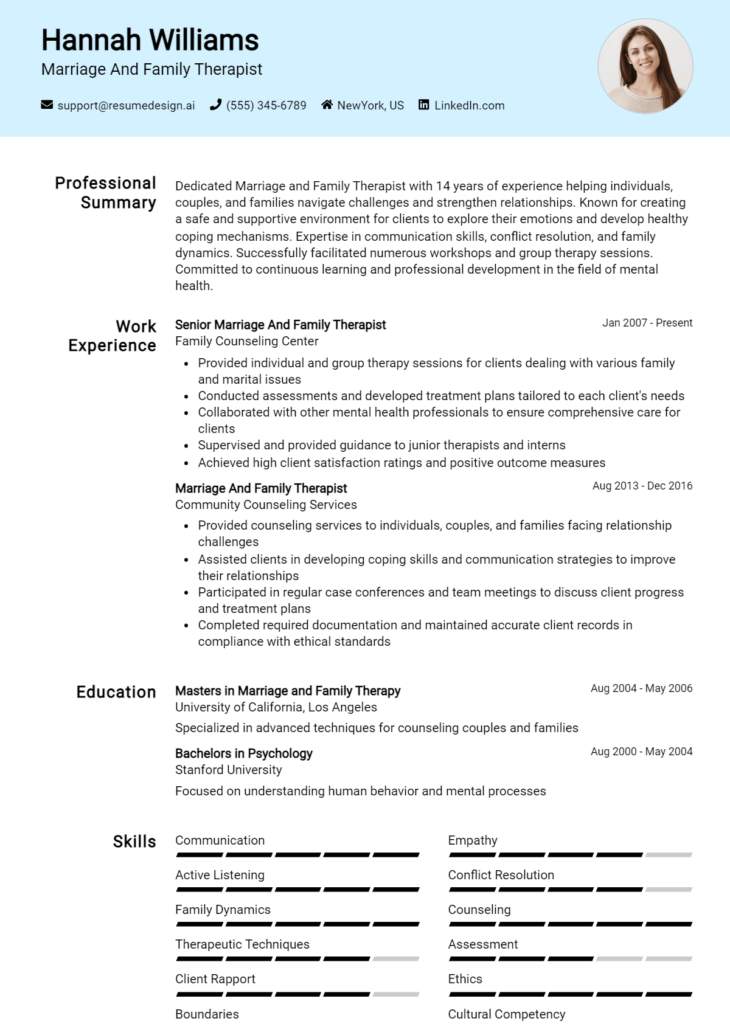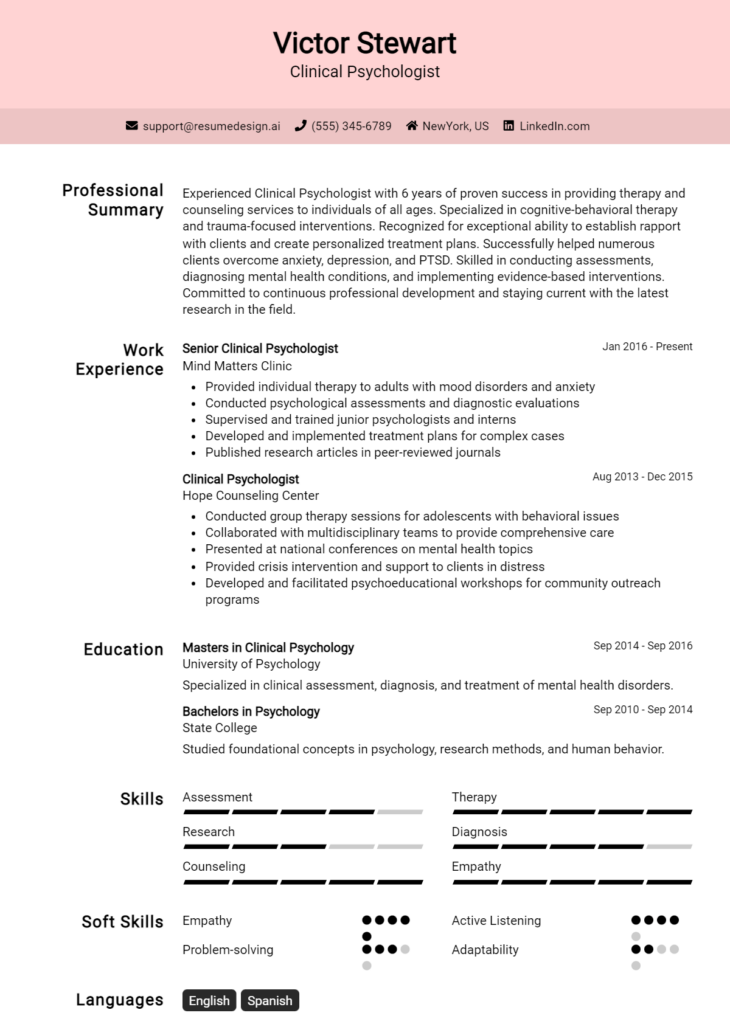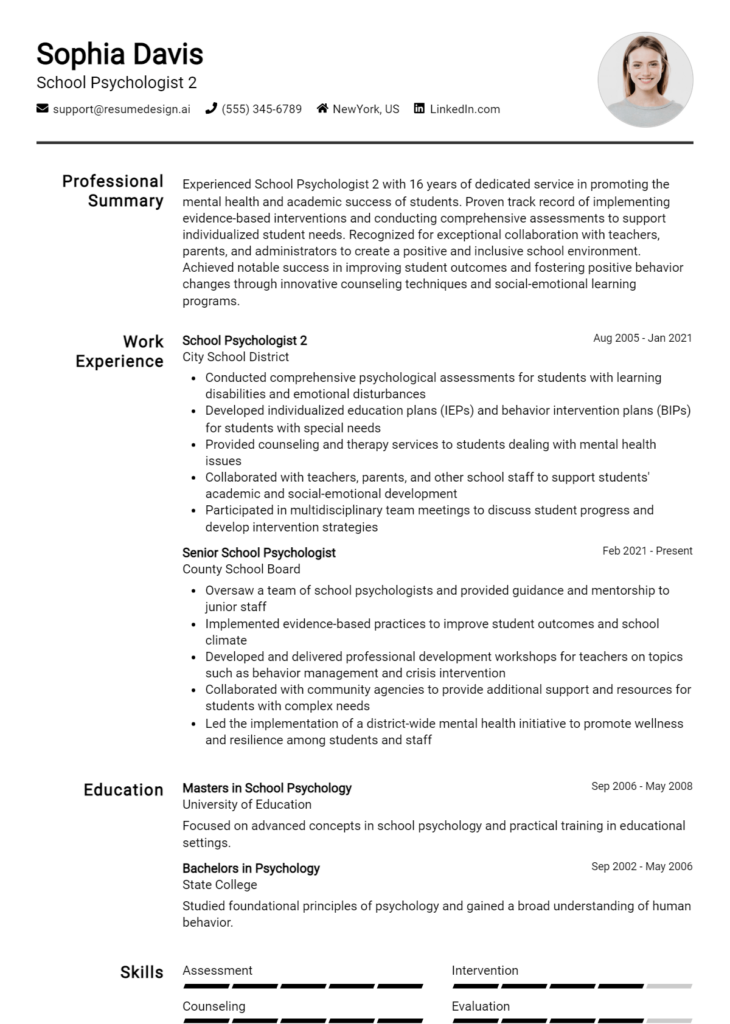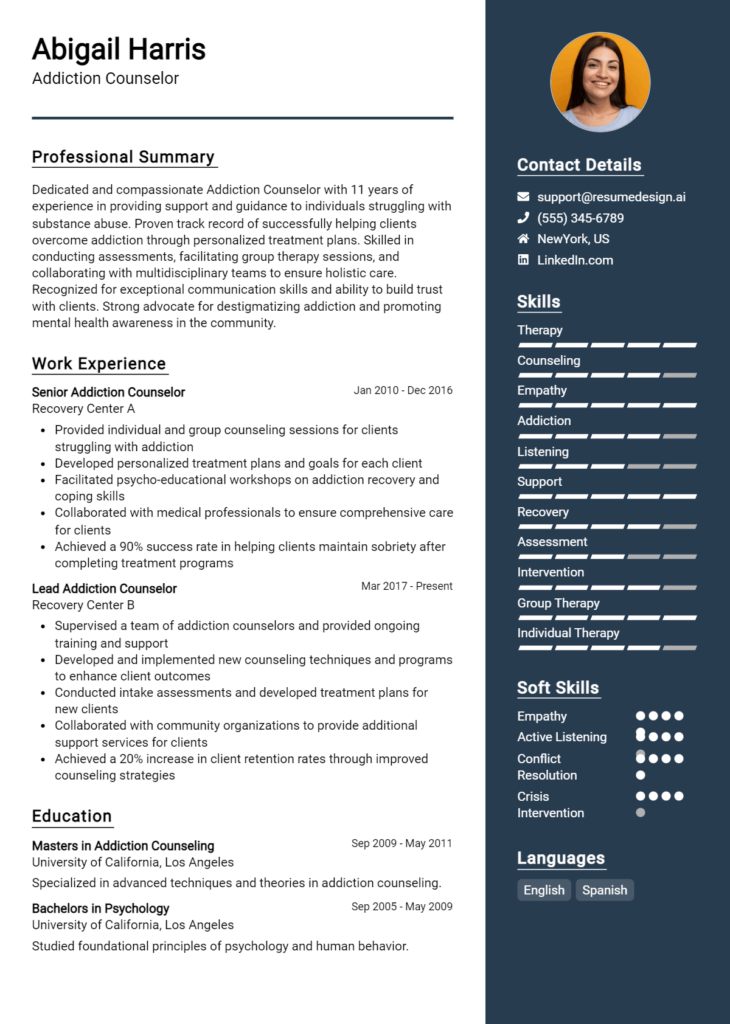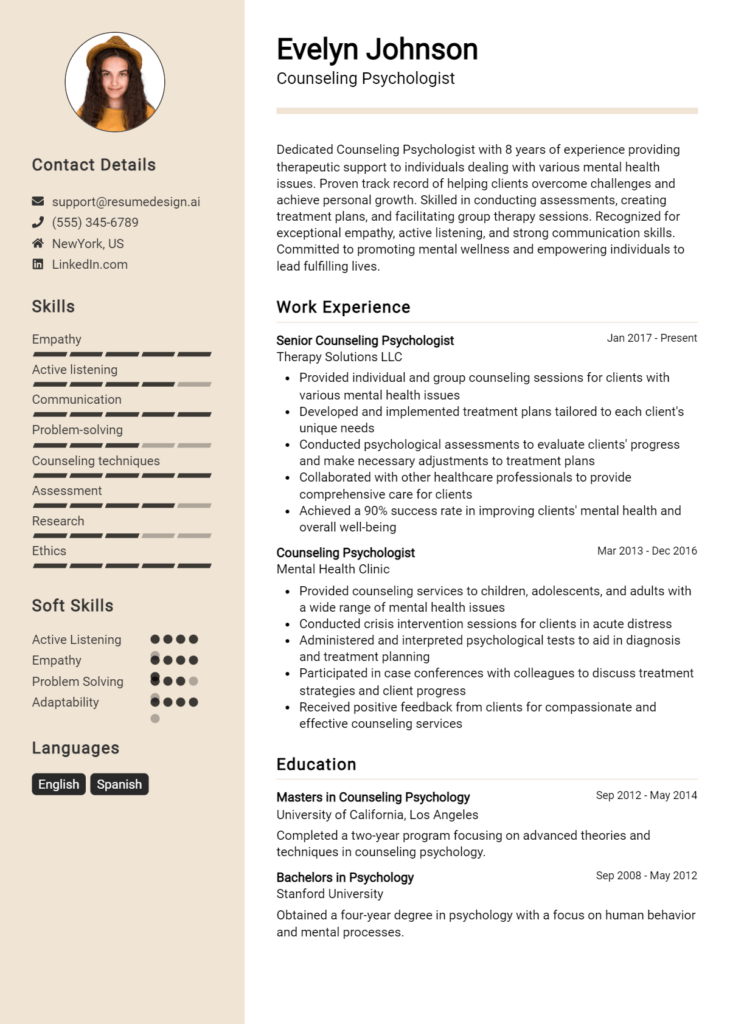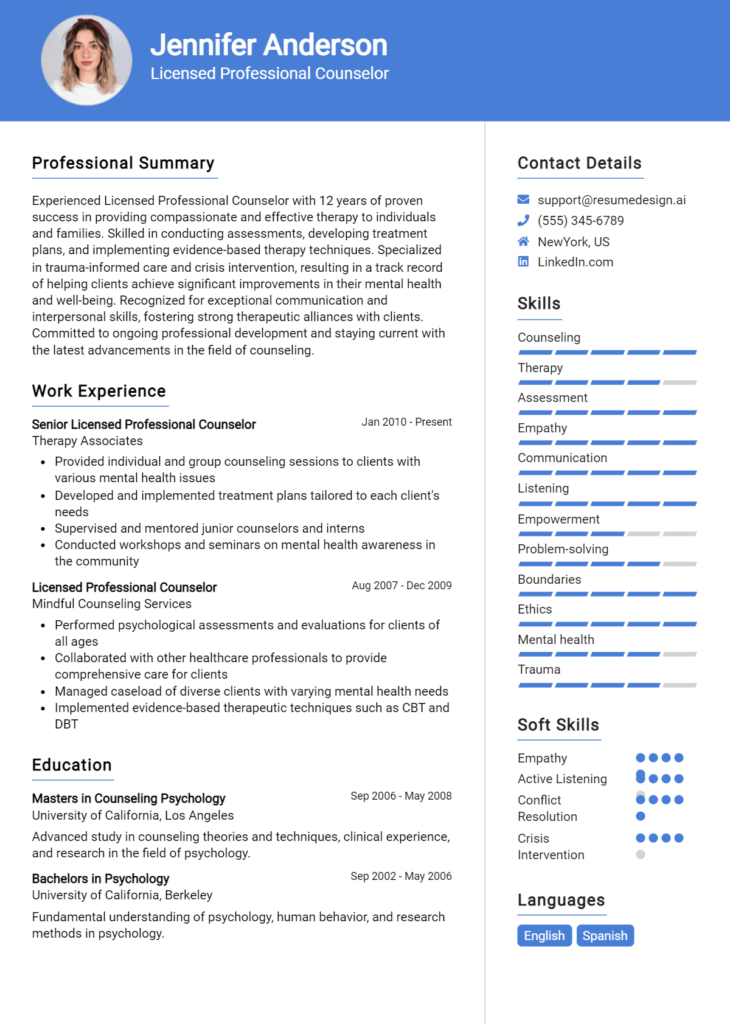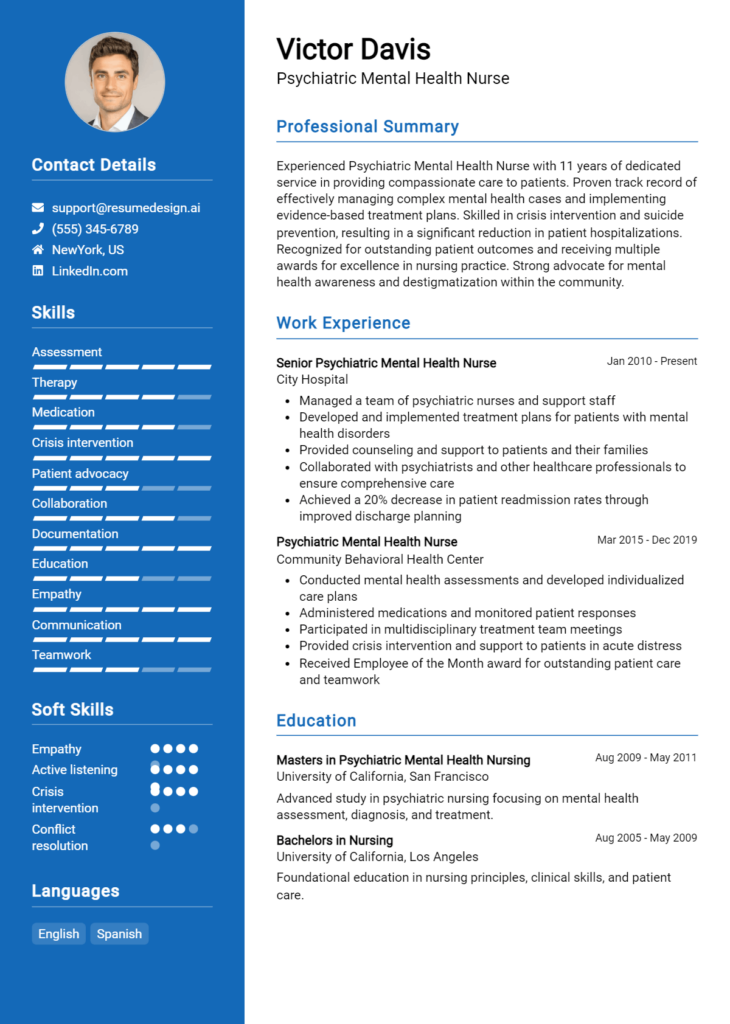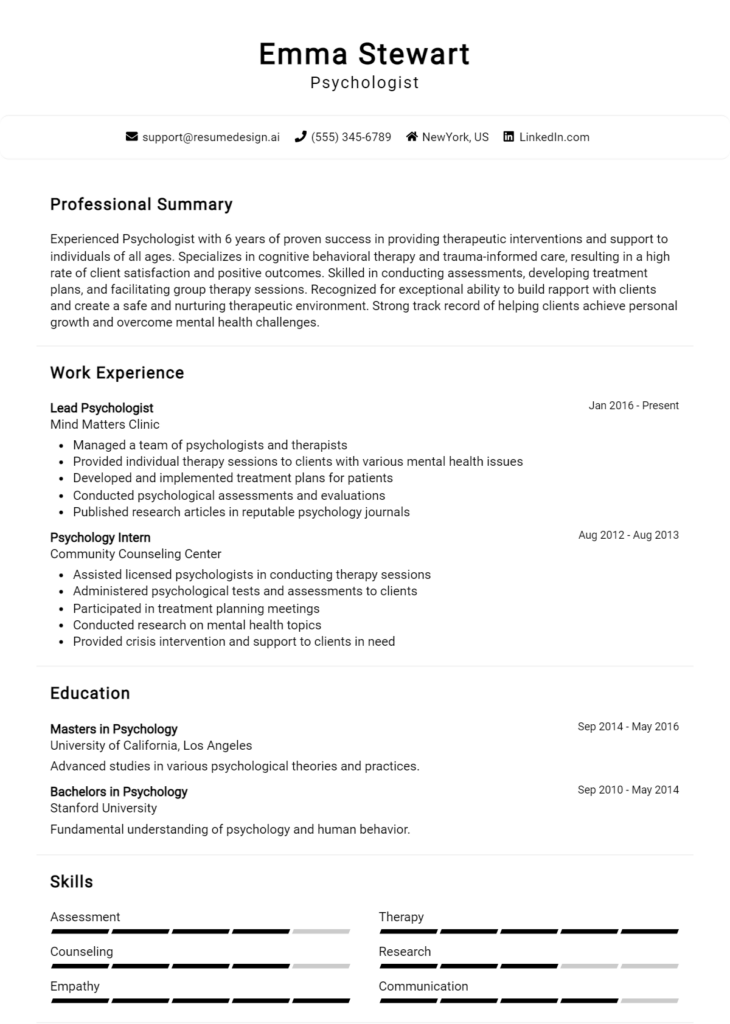Substance Abuse Counselor Core Responsibilities
A Substance Abuse Counselor plays a crucial role in aiding individuals struggling with addiction by providing support, guidance, and treatment plans tailored to their needs. Key responsibilities include assessing client needs, developing recovery strategies, and collaborating with healthcare professionals and community resources to ensure comprehensive care. Essential skills encompass technical knowledge of treatment modalities, operational management of case files, and strong problem-solving capabilities. These competencies significantly contribute to organizational goals, and a well-structured resume can effectively highlight these qualifications for potential employers.
Common Responsibilities Listed on Substance Abuse Counselor Resume
- Conduct comprehensive assessments of client needs and substance use history.
- Develop individualized treatment plans in collaboration with clients.
- Facilitate individual and group counseling sessions.
- Monitor client progress and adjust treatment plans as necessary.
- Provide crisis intervention and support during emergencies.
- Educate clients about substance abuse and recovery strategies.
- Maintain accurate and confidential client records.
- Collaborate with healthcare providers and community organizations.
- Advocate for clients' access to additional services and resources.
- Participate in staff meetings and professional development opportunities.
- Stay informed of current trends and best practices in substance abuse treatment.
High-Level Resume Tips for Substance Abuse Counselor Professionals
In the competitive field of substance abuse counseling, a well-crafted resume serves as a critical tool for standing out to potential employers. It is often the first impression a hiring manager has of a candidate, making it essential to reflect both relevant skills and notable achievements effectively. A resume not only summarizes your professional journey but also communicates your passion for helping individuals overcome addiction and lead healthier lives. This guide will provide practical and actionable resume tips specifically tailored for substance abuse counselor professionals, ensuring your application resonates with hiring decisions.
Top Resume Tips for Substance Abuse Counselor Professionals
- Tailor your resume to match the job description by incorporating keywords and phrases that highlight your qualifications relevant to the specific position.
- Showcase relevant experience by detailing your previous roles in counseling, including responsibilities and the populations you served.
- Quantify your achievements, such as the number of clients successfully counseled or programs developed, to provide tangible evidence of your impact.
- Highlight industry-specific skills such as crisis intervention, motivational interviewing, and knowledge of treatment modalities that are essential for a substance abuse counselor.
- Include certifications and licenses, such as Certified Alcohol and Drug Counselor (CADC) or National Certified Addiction Counselor (NCAC), to demonstrate your qualifications.
- Use a clean, professional format that enhances readability, making it easy for hiring managers to scan your resume quickly.
- Incorporate a strong summary statement at the top that encapsulates your passion for counseling and your unique qualifications in the field.
- Highlight your ability to work in multidisciplinary teams and collaborate with healthcare providers, which is often crucial in treatment settings.
- Consider including volunteer work or internships related to substance abuse counseling to showcase your commitment to the field.
Implementing these tips can significantly enhance your chances of landing a job in the substance abuse counselor field. A polished and tailored resume not only showcases your qualifications but also demonstrates your dedication and readiness to make a meaningful difference in the lives of others struggling with addiction.
Why Resume Headlines & Titles are Important for Substance Abuse Counselor
In the competitive field of substance abuse counseling, a well-crafted resume headline or title is crucial for making a strong first impression on hiring managers. A powerful headline serves as a concise summary of a candidate's qualifications and expertise, instantly capturing attention and encouraging further review of the resume. By distilling key attributes into a single impactful phrase, candidates can effectively communicate their value and relevance to the role they are applying for. A strong headline should be concise, relevant, and directly connected to the specific job, ensuring it resonates with potential employers and reflects the candidate's unique skills and experiences.
Best Practices for Crafting Resume Headlines for Substance Abuse Counselor
- Keep it concise: Aim for a headline that is no longer than one or two lines.
- Be role-specific: Tailor the headline to reflect the specific position of substance abuse counselor.
- Highlight key qualifications: Incorporate relevant skills, certifications, or experiences that set you apart.
- Use impactful language: Choose strong, action-oriented words that convey confidence and expertise.
- Include relevant metrics: If applicable, mention achievements or statistics that demonstrate your effectiveness.
- Avoid jargon: Use clear language that can be easily understood by hiring managers and HR professionals.
- Reflect your personal brand: Ensure the headline aligns with your professional identity and career goals.
- Stay updated: Revise the headline as needed to align with evolving industry standards and job descriptions.
Example Resume Headlines for Substance Abuse Counselor
Strong Resume Headlines
Compassionate Substance Abuse Counselor with Over 5 Years of Experience in Recovery Support
Certified Substance Abuse Counselor Specializing in Holistic Recovery Approaches
Results-Driven Counselor with Proven Success in Reducing Relapse Rates by 30%
Weak Resume Headlines
Counselor Looking for Job
Experienced Professional in Mental Health
The strong headlines are effective because they clearly communicate the candidate’s specific skills, experiences, and achievements in substance abuse counseling. They use precise language that highlights what the candidate brings to the table, making them memorable and relevant to hiring managers. Conversely, the weak headlines fail to impress due to their vagueness and lack of specificity; they do not provide any meaningful insights into the candidate’s qualifications or unique strengths, making it difficult for employers to see the value they would bring to the role.
Writing an Exceptional Substance Abuse Counselor Resume Summary
A well-crafted resume summary is essential for a Substance Abuse Counselor, as it serves as the first impression for hiring managers. This brief yet impactful section quickly captures attention by highlighting key skills, relevant experience, and notable accomplishments that align with the job role. A strong summary not only conveys the candidate’s professional identity but also demonstrates their understanding of the responsibilities associated with the position. It should be concise, usually consisting of two to four sentences, and tailored specifically to the job being applied for, making it a critical component in standing out among other applicants.
Best Practices for Writing a Substance Abuse Counselor Resume Summary
- Quantify achievements: Use numbers to illustrate your impact, such as the number of clients helped or percentage improvements in recovery rates.
- Focus on relevant skills: Highlight specific skills pertinent to substance abuse counseling, such as crisis intervention, therapeutic techniques, or group facilitation.
- Tailor to the job description: Customize the summary to reflect keywords and requirements from the job listing.
- Keep it concise: Aim for a summary that is no longer than four sentences to maintain clarity and focus.
- Showcase certifications: Include relevant certifications or licenses that enhance your qualifications as a counselor.
- Emphasize interpersonal skills: Highlight your ability to build rapport and communicate effectively with clients.
- Incorporate a personal touch: If appropriate, express your passion for helping individuals overcome substance abuse challenges.
Example Substance Abuse Counselor Resume Summaries
Strong Resume Summaries
Dedicated Substance Abuse Counselor with over 5 years of experience in facilitating recovery programs for at-risk populations, achieving a 75% success rate in client retention and recovery. Skilled in crisis intervention and motivational interviewing, fostering trust and open communication with clients.
Compassionate and results-oriented Counselor with a Master's in Social Work and certification in Addiction Counseling. Successfully managed a caseload of 30+ clients, leading to a 40% decrease in relapse rates through tailored therapeutic strategies.
Experienced Substance Abuse Counselor with a proven track record of developing and implementing effective treatment plans. Increased client engagement by 60% through innovative group therapy sessions and community outreach initiatives.
Weak Resume Summaries
Substance Abuse Counselor with some experience helping people with addiction problems.
Hardworking professional looking for a position in substance abuse counseling. I have worked with various clients in different settings.
The strong resume summaries are effective because they provide specific examples of achievements, demonstrate clear skills relevant to substance abuse counseling, and use quantifiable results to illustrate their impact. In contrast, the weak summaries are vague and lack detail, failing to convey concrete accomplishments or depth of experience, making them less compelling to hiring managers.
Work Experience Section for Substance Abuse Counselor Resume
The work experience section of a Substance Abuse Counselor resume is crucial as it provides potential employers with insights into the candidate's practical knowledge and real-world application of counseling techniques. This section not only highlights the technical skills acquired through previous roles but also demonstrates the ability to manage teams effectively and deliver high-quality services to clients. By quantifying achievements and aligning experiences with industry standards, candidates can create a compelling narrative that showcases their impact in the field of substance abuse counseling.
Best Practices for Substance Abuse Counselor Work Experience
- Detail specific counseling techniques and methodologies utilized in past roles.
- Quantify results, such as the percentage of clients who achieved sobriety or completed treatment programs.
- Highlight leadership roles in team settings, emphasizing collaboration and conflict resolution.
- Showcase any certifications or special training relevant to substance abuse counseling.
- Use action verbs to describe responsibilities and accomplishments clearly and dynamically.
- Align experience descriptions with recognized industry standards and best practices.
- Incorporate feedback or testimonials from clients or colleagues to enhance credibility.
- Focus on continuous professional development and any innovative practices implemented in the workplace.
Example Work Experiences for Substance Abuse Counselor
Strong Experiences
- Led a multidisciplinary team in developing a comprehensive treatment plan that resulted in a 30% increase in client retention rates over one year.
- Implemented evidence-based counseling techniques, achieving a 75% success rate in clients completing their prescribed treatment programs.
- Facilitated group therapy sessions that improved communication skills among participants, as evidenced by a 40% decrease in reported conflicts.
- Trained and mentored new counselors, enhancing team performance and contributing to a 20% increase in overall client satisfaction scores.
Weak Experiences
- Worked with clients on recovery plans.
- Helped to manage a team of counselors.
- Participated in counseling sessions.
- Assisted with tasks related to client care.
The strong experiences listed above are considered impactful due to their quantifiable outcomes, demonstrating a clear link between the candidate's actions and positive results in client care and team effectiveness. In contrast, the weak experiences lack specific details and measurable achievements, making them less compelling and failing to showcase the candidate's true capabilities and contributions in the field of substance abuse counseling.
Education and Certifications Section for Substance Abuse Counselor Resume
The education and certifications section of a Substance Abuse Counselor resume is crucial in establishing a candidate's qualifications and expertise in the field. This section not only showcases the candidate's academic background but also emphasizes their commitment to professional development through industry-relevant certifications and continuous learning efforts. Highlighting relevant coursework, certifications, and specialized training can significantly enhance a candidate's credibility, demonstrating their alignment with the specific requirements of the job role and their readiness to support individuals struggling with substance abuse issues.
Best Practices for Substance Abuse Counselor Education and Certifications
- Include relevant degrees in psychology, social work, or counseling that relate directly to substance abuse.
- List industry-recognized certifications, such as Certified Alcohol and Drug Counselor (CADC) or National Certified Addiction Counselor (NCAC).
- Provide details on specialized training programs or workshops attended that focus on addiction treatment methodologies.
- Highlight relevant coursework that pertains directly to substance abuse counseling, such as addiction psychology or crisis intervention.
- Use specific dates for certifications to indicate current knowledge and ongoing professional development.
- Emphasize any advanced credentials, such as a master's degree or licensure, that may set the candidate apart from others.
- Tailor the education and certifications section to align with the specific job description and requirements of the role.
- Avoid listing outdated or irrelevant qualifications that do not contribute to your candidacy as a Substance Abuse Counselor.
Example Education and Certifications for Substance Abuse Counselor
Strong Examples
- M.A. in Clinical Mental Health Counseling, University of XYZ, 2021
- Certified Alcohol and Drug Counselor (CADC), Certification Number: 12345, Issued: 2022
- Completed coursework in Substance Abuse Treatment, Motivational Interviewing, and Cognitive Behavioral Therapy.
- Licensed Professional Counselor (LPC), State of ABC, License Number: 67890
Weak Examples
- B.A. in History, University of XYZ, 2015
- Certification in General Counseling Techniques, 2010 (not specific to substance abuse)
- Completed a workshop on Time Management, 2021 (not relevant to counseling)
- High School Diploma, 2008
The strong examples are considered effective because they directly align with the qualifications and skills needed for a Substance Abuse Counselor, showcasing relevant education and certifications that reinforce the candidate's expertise in addiction treatment. In contrast, the weak examples highlight irrelevant or outdated qualifications that do not contribute to the candidate's suitability for the role, potentially undermining their credibility in the eyes of employers. It is essential for candidates to focus on their most pertinent achievements to make a compelling case for their candidacy.
Top Skills & Keywords for Substance Abuse Counselor Resume
The role of a Substance Abuse Counselor is critical in helping individuals navigate the challenging path of recovery from addiction. A well-crafted resume that highlights both soft and hard skills is essential for standing out in this field. Employers seek candidates who not only possess the technical knowledge required for effective counseling but also demonstrate interpersonal abilities that foster trust and rapport with clients. A strong emphasis on skills in a resume not only showcases a candidate's qualifications but also reflects their commitment to providing compassionate care. For those interested in crafting a compelling resume, understanding the key skills needed for a Substance Abuse Counselor can significantly enhance employment prospects.
Top Hard & Soft Skills for Substance Abuse Counselor
Soft Skills
- Empathy
- Active listening
- Communication skills
- Conflict resolution
- Patience
- Emotional intelligence
- Cultural competence
- Problem-solving
- Adaptability
- Teamwork
Hard Skills
- Knowledge of addiction treatment modalities
- Crisis intervention techniques
- Assessment and evaluation skills
- Knowledge of mental health disorders
- Treatment planning
- Familiarity with legal and ethical guidelines
- Case management
- Group facilitation skills
- Documentation and reporting
- Understanding of pharmacology related to substance abuse
For more insights on the essential skills needed in your profession, check out our comprehensive guide on skills. Additionally, to enhance your resume effectively, consider emphasizing your work experience in the field, as it plays a crucial role in showcasing your practical abilities and achievements.
Stand Out with a Winning Substance Abuse Counselor Cover Letter
As a dedicated and compassionate Substance Abuse Counselor with over five years of experience in addiction recovery, I am excited to apply for the position at [Company Name]. My extensive background in counseling individuals struggling with substance use disorders has equipped me with the skills necessary to help clients navigate their recovery journey. I am committed to fostering a supportive environment that encourages growth, resilience, and empowerment, and I am eager to bring this passion to your team.
In my previous role at [Previous Company Name], I successfully developed and implemented personalized treatment plans for clients, utilizing evidence-based practices and a holistic approach to recovery. I have collaborated with multidisciplinary teams to provide comprehensive care, including group therapy sessions, individual counseling, and community outreach programs. My ability to build trusting relationships with clients has been instrumental in my work, enabling them to feel safe and supported as they confront their challenges. I am particularly adept at utilizing motivational interviewing techniques to encourage self-reflection and enhance clients’ intrinsic motivation to change.
I am also passionate about continuous professional development, and I regularly attend workshops and training sessions to stay updated on the latest advancements in addiction treatment. My certifications in [specific certifications] further enhance my qualifications, allowing me to provide the highest level of care. I am excited about the opportunity to contribute to [Company Name] and collaborate with a team that shares my commitment to helping individuals reclaim their lives from addiction.
Thank you for considering my application. I am looking forward to the possibility of discussing how my background, skills, and enthusiasm for helping others align with the goals of [Company Name]. I am eager to contribute to the impactful work being done at your organization and help clients achieve lasting recovery.
Common Mistakes to Avoid in a Substance Abuse Counselor Resume
When crafting a resume for a Substance Abuse Counselor position, it is crucial to portray your qualifications and experience effectively. However, many candidates make common mistakes that can hinder their chances of landing an interview. Avoiding these pitfalls can significantly enhance the impact of your resume and present you as a strong candidate for the role.
Vague Job Descriptions: Failing to provide specific details about past roles can leave hiring managers uncertain about your actual responsibilities and achievements. Be clear and concise about your duties and successes.
Ignoring Relevant Certifications: Not highlighting relevant certifications, such as CADC (Certified Alcohol and Drug Counselor) or LPC (Licensed Professional Counselor), can make your resume less competitive. Ensure these qualifications are prominently featured.
Lack of Tailoring: Submitting a generic resume without tailoring it to the specific job can give the impression of disinterest or lack of effort. Customize your resume to reflect the skills and experiences that align with the job description.
Overloading with Jargon: While industry terminology is important, overloading your resume with acronyms and jargon can alienate hiring managers who may not be familiar with specific terms. Use clear language and explain any necessary jargon.
Ignoring Soft Skills: Substance abuse counseling requires strong interpersonal skills, empathy, and communication abilities. Neglecting to highlight these soft skills can diminish your appeal. Incorporate examples that showcase these traits.
Poor Formatting: A cluttered or poorly organized resume can make it difficult for employers to quickly find key information. Use clear headings, bullet points, and consistent formatting to enhance readability.
Omitting Volunteer Experience: Many counselors gain valuable experience through volunteer work. Not including this information can overlook relevant skills and show a lack of commitment to the field. Include any volunteer roles that relate to counseling or substance abuse.
Failing to Quantify Achievements: Providing vague statements about your contributions without quantifying them can weaken your impact. Use numbers and specific outcomes to illustrate your effectiveness, such as the number of clients served or recovery rates achieved.
Conclusion
As a Substance Abuse Counselor, your role is vital in guiding individuals through their recovery journey and helping them reclaim their lives from addiction. Throughout this article, we've explored the essential skills and qualifications needed for this profession, such as effective communication, empathy, and a deep understanding of various treatment approaches. We also discussed the importance of continual professional development and staying updated with the latest research and therapeutic techniques in the field.
In conclusion, your resume is a crucial tool in showcasing your expertise and experiences. It's essential to present your qualifications clearly and compellingly to stand out in this fulfilling yet competitive field. Now is the perfect time to review and refine your Substance Abuse Counselor resume to reflect your best self.
To assist you in this process, consider utilizing various resources available at your fingertips. You can explore resume templates that suit your style, use a resume builder for a user-friendly experience, check out resume examples for inspiration, and craft a compelling introduction with cover letter templates. Take the next step in your career today by enhancing your resume and positioning yourself for success in the field of substance abuse counseling!

